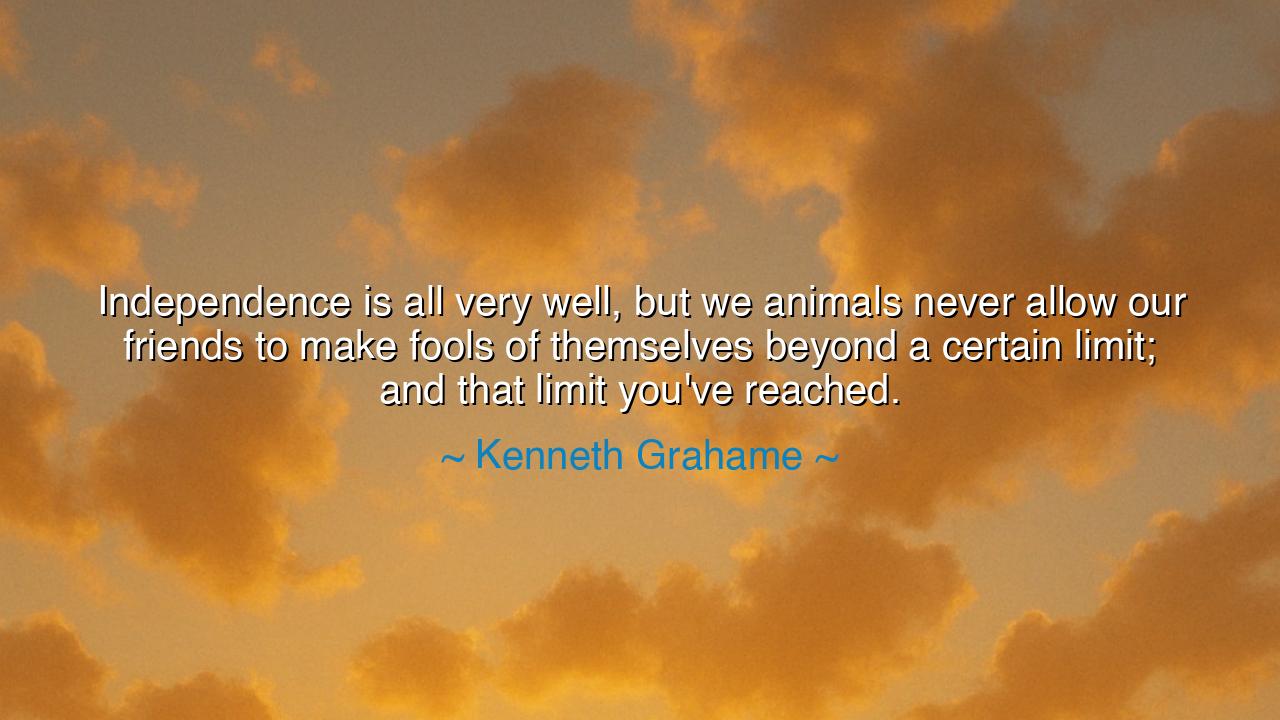
Independence is all very well, but we animals never allow our
Independence is all very well, but we animals never allow our friends to make fools of themselves beyond a certain limit; and that limit you've reached.






There are times when freedom, left unchecked, becomes folly — when the cry for independence crosses into the territory of self-destruction. In Kenneth Grahame’s timeless work The Wind in the Willows, this truth is spoken through the gentle wisdom of the animal world: “Independence is all very well, but we animals never allow our friends to make fools of themselves beyond a certain limit; and that limit you’ve reached.” These words, playful on the surface, carry a profound moral beneath their fur and feathers. They remind us that even in the pursuit of liberty, there must remain a place for friendship, for guidance, and for the compassionate restraint that keeps one soul from falling too far astray.
To understand this saying, we must recall its source — the story of Mr. Toad, the boastful, impulsive, and reckless creature whose pride in his own independence leads him into chaos. His friends — Mole, Rat, and Badger — love him deeply, but they also see the danger in his freedom without wisdom. When Toad refuses to listen, they step in, not to crush his spirit, but to save him from himself. Grahame, writing through these animals, reveals a truth that applies not only to wayward toads but to all of humankind: that independence without humility becomes not strength, but arrogance. And when pride blinds a friend to reason, it is an act of love — not tyranny — to draw the line.
In this way, Grahame’s words echo an older and deeper law of life — that no creature, however strong or wise, is truly self-sufficient. The lion has his pride, the wolf his pack, the man his community. True independence does not mean isolation; it means freedom in balance with responsibility. Even the fiercest beast depends on the harmony of the forest, just as even the proudest soul depends on the kindness and counsel of others. To deny this truth is to wander into the wilderness of ego, where freedom turns to folly and strength to ruin.
We find this lesson mirrored throughout the ages. Consider the fall of Napoleon Bonaparte, who began his journey as a liberator but ended as a conqueror enslaved by his own ambition. His independence from the counsel of others, his refusal to be checked by moderation or humility, led him from the throne of Europe to exile on a lonely island. Like Toad, he reached the limit that his friends and allies could not save him from. Independence, when untempered by wisdom, becomes a fire that consumes its bearer.
Grahame’s message, though spoken in the gentle tone of children’s literature, is deeply philosophical. He teaches that love and friendship are the natural boundaries of freedom. We are not meant to live as untethered beings, for our greatest growth comes through connection. The true friend is not the one who praises your every choice, but the one who dares to say, “Stop — you are losing yourself.” Such words may sting in the moment, but they are the medicine of the heart, the voice of care disguised as correction. The ancients called this philia — the noble friendship that binds free souls together not through control, but through mutual respect.
And yet, there is tenderness in Grahame’s wisdom. He does not mock the one who errs; he simply reminds us that compassion sometimes must wear the face of firmness. When a friend intervenes, it is not to take away another’s freedom, but to protect the sanctity of it. For freedom without boundaries is chaos, and chaos leads only to sorrow. Thus, the highest form of love is not indulgence, but guidance — the steady hand that turns the reckless from the cliff’s edge while still allowing them to walk their path.
So, my child, remember this truth: independence and friendship are not enemies but allies. Cherish your freedom, but do not let it make you deaf to the voices of those who love you. When your pride blinds you, listen to the quiet counsel that comes from those who have walked before you. And when you see another wandering into folly, have the courage to speak — not to command, but to care. For as Kenneth Grahame reminds us, we are all creatures in the same forest, bound not only by our right to roam, but by our duty to keep one another from losing the way. In this, the wild heart finds not constraint, but its truest form of peace.






AAdministratorAdministrator
Welcome, honored guests. Please leave a comment, we will respond soon